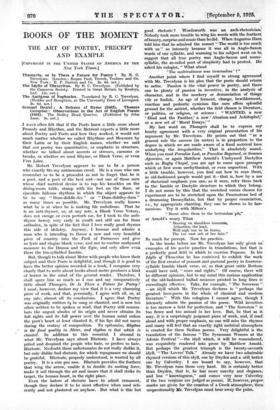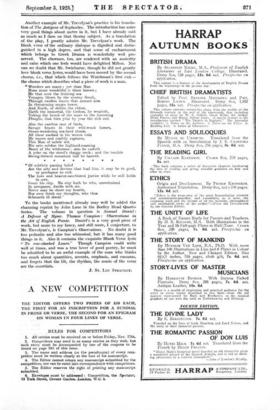BOOKS OF THE MOMENT THE ART OF POETRY, PRECEPT AND
EXAMPLE [COPYRIGHT IN THE UNITED STATES OF AMERICA BY TILE New York Times.]
The Idylls of Theocritus. By R. C. Trevelyan. (Published by the Casanova Society. Printed in Great Britain by Kealeys, Ltd. 15s. net.)
The Antigone of Sophocles. Translated by R. C. Trevelyan. (Hodder and Stoughton, at The University Press of Liverpool. 38. 6d. net.) I HAVE often felt that if the Poets knew a little more about Prosody and Rhythm, and the Metrical experts a little more about Poetry and Poets and how they worked, it would not much matter whether we called Rhythms and Measures by their Latin or by their English names, whether we said that our poetry was quantitative, or emphatic in structure, whether we talked about accents or stresses, caesuras or breaks, or whether we used Rhyme, or Blank Verse, or even Vers Libre.
Mr. Robert Trevelyan appears to me to be a person who exactly fits my antinomian creed. He is a man who can remember so to be a prosodist as not to forget that he is a poet, and a poet of the best sort—not one of those men whose chief metrical device is to rap his knuckles on the dining-roofia table, stamp with his feet on the floor, or ejaculate hideous rhythms in which the object appears to be to say " Dum-diddle-dee " or " Dtnn-diddley-duo " as many times as possible. Mr. Trevelyan really knows what he is at when he is making life melodious. That he is an anti-rhymer, or, at any rate, a Blank Verse Votary, does not enrage or even perturb me, for I took to the anti- rhyme heresy very early in youth and still am far from orthodox, in spite of the faet that I love really good rhymes this side of idolatry. Anyway, I honour and admire a man who is intending to throw a new and very beautiful piece of country into the Park of Parnassus and give us lyric and elegiac blank verse, and not to confine unrhymed measure to the Drama and the Epic,- and only allow even there the ten-syllabled iambic.
But, though to talk about Metre with people who know their subject and their Poets is delightful, and though it is good to have the better opinion recorded in a book, I recognize very clearly that to write about books about metre produces a kind of horror in the mind of the general reader. Therefore, shall spare film as much as I can and -say comparatively little about Thamyris, Or Is There a Future for Poetry ?. I must, however, declare my view that it is a very charming piece of work, and that, personally, I agree with all, or, at any rate, almost all its conclusions. I agree that Poetry was originally written to be sung or chanted, and is now too often written to be spoken or read, that Poetry still remem- bers the august abodes of its origin and never obtains its full rights and its full power over the human mind unless the poet's heart at least chanted it, if his lips did not move during the ecstasy of composition. To epitomize, Rhythm
' is the final quality in Metre, and rhythm is that which is chanted. In addition to this essential, I abound in what Mr. Trevelyan says about Rhetoric. I have always pitied and despised the people who hate, or profess to hate, Rhetoric. No doubt these unfortunates do not really dislike it, but only dislike bad rhetoric, for which repugnance we should be grateful. Rhetoric; properly understood, is wanted by all poetry. It is a sine qua non. Rhetoric provides the feathers that wing the arrow, enable it to double its smiting force, make it sail through the air and insure that it shall strike its target, the human heart, in the right place.
Even the haters of rhetoric have to admit ornament, though they declare it to be most effective when used reti- cently and.not plastered on anyhow.. But what is this but
good rhetoric ? Wordsworth was an arch-rhetorician) Nobody took more trouble to wing his words with the feathers; of beauty, surprise and music than he did. When Augustus Hare; told him that he admired the sonnet " The world is too much with us " so intensely because it was all in Anglo-Saxon words of one syllable, and warming to his subject went on to suggest that all true poetry was Anglo-Saxon and mono-'
syllabic, the so-called poet of simplicity had to protest. 11
asked his eulogist, " What about
' The multitudinous seas incarnadine ' l "
Another point where I find myself in strong agreement
with Mr. Trevelyan is his plea that the poets should return to satire. Passion is the vital power in poetry, and there' can be plenty of passion in invective, in the analysis of
character, and in the mockery or denunciation of things' vile or foolish. An age of ferment, change, bewilderment,•
reaction and pedantic cynicism like ours offers splendid ground for the satirist, whether the field chosen is literature,: or politics, or religion, or science : " WANTED, a new ' Hind and the Panther,' a new Absalom and Achitophel,', or a new set of ' Moral Essays. "
My last word on Thamyris shall be to express mp, hearty agreement with a very original presentation of his argument by Mr. Trevelyan. He points out that " as a general rule the success (in metre) is in proportion to the degree in which we are made aware of a fixed metrical base underlying the irregularities." That is absolutely sound. When you read Paradise Lost, or Paradise Regained, or Samson Agonistes, or again Matthew Arnold's Unrhymed Dactylics such as Rugby Chapel, you are apt to come upon passages which at first seem unrhytlunical, or even unpoetieal. With
a little trouble, however, you find out how to scan them,' as old-fashioned people would put it—that is, how by a use of rhetorical emphasis you can, as it were, refer them back to the Iambic or Dactylic structure to which they belong.' I do not mean by this that the wretched verses chosen for
experiment are to be stretched upon the Procrustean bed of a drumming Deeasyllabic, but that by proper enunciation, i.e., by appropriate chanting, they can be shown to be har- monious. Try it with Milton's
" Burnt after them to the bottomless pit,"
or Arnold's weary Titan " Bearing on shoulders immense, Atlantenn, the load,
Well nigh not to be borne, The too vast orb of her fate."
So much for precept. Now for practice. In the books before me Mr. Trevelyan has only given us! examples of his poetic practice in translations, but that is a -perfectly good -field in which to exercise Pegasus. In his Idylls of Theocritus he has contrived to exhibit the work
of the first creator of peasant and pastoral poetry in fourteen- syllable Iambic blank verse, or, as' that great critic Bottom/ would have said, " sixes and eights." Of course, there will be different opinions, but to•my mind this curious application of the old-fashioned ballad measure printed in long lines is• exceedingly effective. Take, for example, " The Sorceress "
—an idyll -which Mr. Trevelyan declares is " perhaps the greatest love-poem in the whole of classical and moderm literature." With this eulogitun I cannot agree, though I: intensely admire the passion of the poem. Wild invective. is too narrow a field for perfection, and " The Sorceress " is, too fierce and too animal in her love. But, be that as it may, it is a surprisingly poignant piece of work, and, if read: aloud and with proper emphasis, no one will miss the rhymes and many will feel that an exactly right metrical atmosphere is created for these Sicilian poems. Very delightful is the translation of the famous " The Syracusan Women at the Adonis Festival "—the idyll which, it will be remembered,'
was exquisitely rendered into prose by Matthew Arnold.: But perhaps the greatest triumph is the twenty-seventh/
idyll, " The Lovers' Talk." Already we have two admirable rhymed versions of this idyll, one by Dryden and a still, better one by Calverley. I am bound to say, however, that Mr. Trevelyan runs them very hard. He is certainly better than Dryden, that is, he has more suavity and elegance, and less " knowingness," and comes very near Calverley,
if the two versions are judged as poems. If, however, proper, marks are given for the creation of a Greek atmosphere, then;
unquestionably Mr. Trevelyan must bear away the palm.
Another example of Mr. Trevelyan's practice is his transla- tion of The Antigone of Sophoeles. The introduction has some very good things about metre in it, but I have already said as much as I dare on that thorny subject. As a translation of the play, I greatly admire Mr. Trevelyan's work. The blank verse of the ordinary dialogue is dignified and distin- guished in a high degree, and that sense of enchantment which belongs to Greek Drama is wonderfully well pre- served. The choruses, too, are rendered with an austerity and calm which one feels would have delighted Milton. Nor can we doubt that Mr. Swinburne, though he did not greatly love blank verse lyrics, would have been moved by the second chorus, i.e., that which follows the Watchman's first exit— the chorus which describes what a piece of work is a man.
" Wonders are many ; yet than Man
None, more wonderful is there known ;
He that over the frothing sea Voyages, blown by the stormy South, 'Through swollen waves that around him In threatening surges tower.
Aocl Earth, of deities the eldest,
' Earth the immortal, the tireless, he wearieth, Yoking the brood of the mare to the furrowing Ploughs, that turn year by year the rich soil.
Also the careless race of birds, Savage beasts in their wild-wood homes, Ocean-wandering sea-bred shoals, All these meshed in his woven toils He snares and craftily captures, This Man of subtle wit.
His arts-subdue the highland-roaming Beast of the wilderness : also he casteth A yoke on the steed's shaggy neck : and the terrible StrOng-thewed mountain bull he tameth.
* * * * • • • * " Of subtlety passing belief Are the arts and devices that lead him, it may be to good, or perchance to evil. The laws and heaven-sanctioned justice while he still holds in awe, Great his city. No city hath he who, unrestrained In arrogance, dwells with sin. Never may he share my hearth, Nor ever think my thoughts, who thus Behemoth ill deeds."
To the books mentioned already may well be added the charming reprint by John Lane in the Bodley Head Quarto Series. The volume in question is Samuel Daniel: A Defence of Ryme. Thomas Campion: Observations in the Art of English Poesie. Daniel's is a very good piece of work, but more to my fancy, and still more, I conjecture, to Mr. Trevelyan's, is Campion's Observations. No doubt it is too pedantic and also too whimsical, but it has many good things in it. Also it contains the exquisite Blank Verse lyric 44 To rose-checked Laura." Though Campion could write well at times, and was a true lover of good poetry, he must be admitted to be an awful example of the man who thinks too much about quantities, accents, emphasis, and caesuras, and forgets that the lilt, the rhythm, the music of the verse
are the essentials. J. ST. LOE STRACHEY.











































 Previous page
Previous page